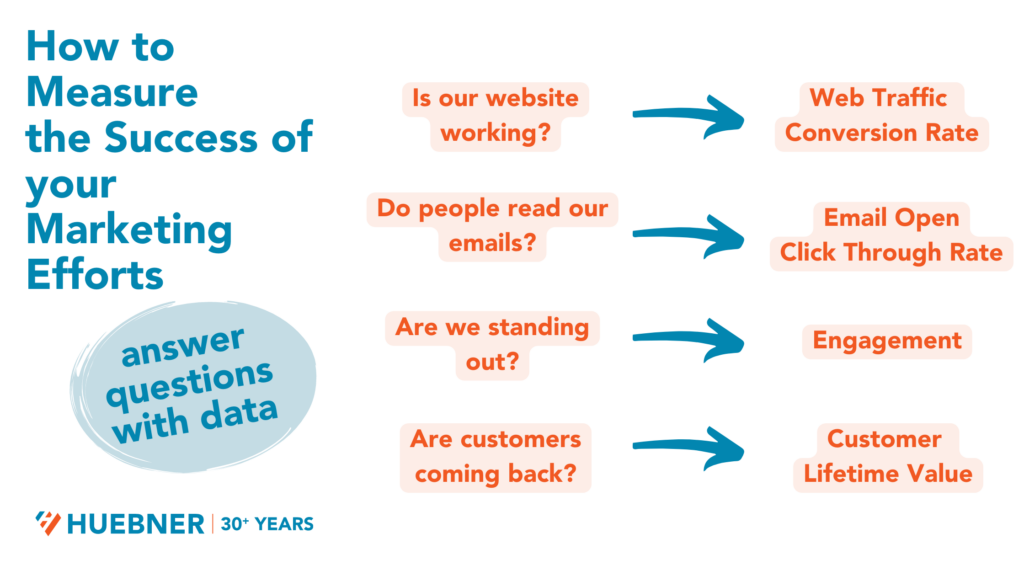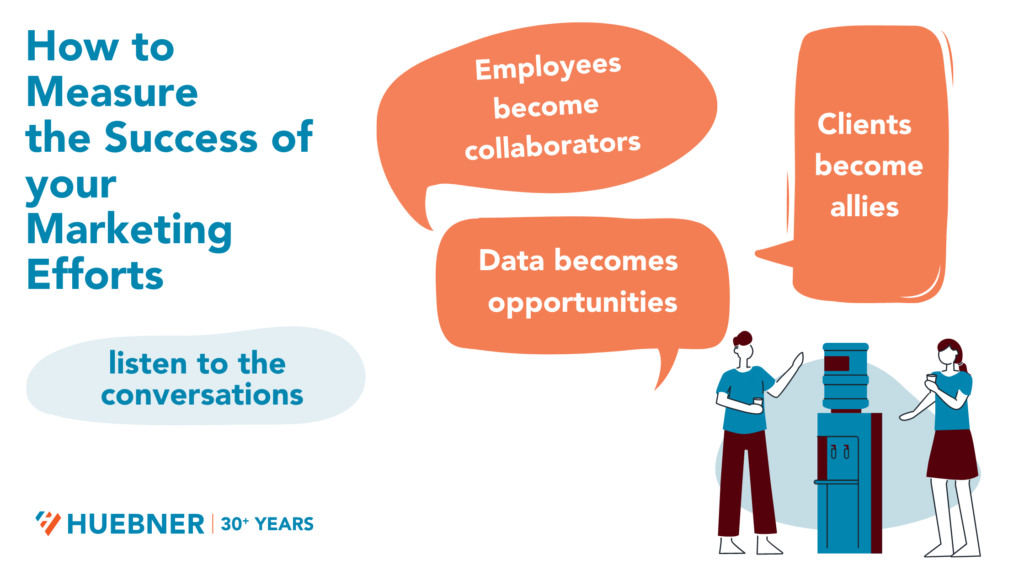Marketing agencies come in all shapes, sizes, and specialties. And any agency worth its salt should offer a diverse toolbox to help you meet your business objectives through a combination of strong positioning and promotion efforts. From content creators and graphic designers to data analysts and social media strategists, marketing agencies utilize a team approach to help you meet important business objectives.
When hiring a marketing agency, your objectives will vary. Beyond simply driving sales and increasing revenue, you may want to:
- Boost your brand’s visibility
- Strengthen your brand’s relevancy
- Determine your brand’s equity
- Increase traffic to your website
- Convert website traffic to sales
- Create engaging content
- Turn customers into fans
- Or all of the above!
A great marketing agency will bring strategic ideas to the table and execute on tactics designed to meet those objectives. Here at Huebner Integrated Marketing, we believe that effective marketing starts with defining your brand’s story in a way that really resonates with your customer. Once you know your story, selling your product becomes much easier.
But how do you know if your marketing agency is succeeding? The answer is all in the data. In this post, we’ll unpack the key performance indicators we believe are most important to measure so you can be sure to get a strong return on your marketing investment.
Key Performance Indicators of a Successful Marketing Agency
Website Traffic & Conversion Rate
The beauty of marketing in the 21st century is you can truly measure every click. You can see your customer’s complete experience: how far they go into your website, where they get stuck, and where you lose them. A successful marketing campaign moves traffic into action, and before you know it, a casual website visitor converts into a customer.
Website traffic and conversion rate data should inform how your marketing agency styles web pages, creates copy, and encourages visitor retention. Your account manager, backed by an analytics department, should be able to give you powerful insights into who stays on your site, who drops off when and where, and who actually converts.
Email Open Rate and Click-through Rate
Email open and click-through rates are an important indicator of the success of your positioning strategy. These stats should provide valuable feedback to your content strategists, copywriters, programmers, and designers, so that they can create:
- Clear and relevant content that drives customers to your website
- Strategically placed CTA’s (calls-to-action) that support sales initiatives
- Images that tell your story and showcase what makes you unique
You should expect to see cohesive, targeted communications in your inbox and enjoy increases in your open rates and click-through rates as you work with an experienced marketing agency—meaning more people are choosing to open your emails and take the action you want to see them take.
Engagement
No matter how you slice it, meaningful engagement starts with storytelling. From your website to your emails, social media, print collateral, and even stakeholder communications, marketing should integrate the story of your brand in a cohesive way that resonates with the intended audience. A powerful story gives your brand equity in its field, helping it stand out and remain relevant in a sea of competitors. A story-led marketing campaign connects with the customer on an emotional level and leads to meaningful, measurable engagement.
Measurable engagement comes in many forms:
- social media likes, shares, or comments
- direct messages on any platform
- email signups
- email responses and click-throughs
- lead form entries
- contact form entries
- whatever other way you are hoping to communicate with your audience
Engagement is contagious: when customers get excited about your product, you don’t just see it in the metrics, you feel it.
Customer Lifetime Value
A successful marketing agency measures a customer’s lifetime value (CLV) to determine the longevity of a customer’s engagement.
For example, John is a new customer who has purchased a $100 chef’s knife. If he never comes back, his CLV is $100. However, if we can convert him into a brand enthusiast, we can encourage repeat site visits and supplemental purchases. This is where marketing comes in.
Effective marketing can give John plenty of reasons to buy complementary knives, a knife roll bag, and perhaps a subscription for a maintenance oil. Prompting John to stay engaged with the brand increases his lifetime value exponentially.
An effective marketing agency should help you discover ways to increase your CLV through bundles, product education campaigns, or subscription enablement. They use meaningful customer data to test strategic tactics, modify campaigns, and increase long-term revenue.

If your objective is to strengthen engagement to drive sales, then these are the key performance indicators that show your marketing agency they’re on the right track.
But sometimes, marketing agencies aren’t just customer creators, they are conversation creators, fanning a company’s spark into a flame. Let’s unpack the key conversations that inspire a company from the inside out.
Key Conversations that Accompany Successful Marketing
Some marketing objectives aren’t just about data, they’re about culture, relatability, and equity—the intangible values that take a product and turn it into a brand. Successful marketing campaigns gets people talking. Here are the conversation shifts that always get our attention:
Turn clients into allies
Are your clients calling to tell you they loved your ad in a magazine? Or are they checking in to learn about a new product they read about? A successful marketing campaign amplifies what makes your company great, and B2B clients become allies in your success.
Turn employees into collaborators
Are your stakeholders happy with the brand’s new visibility? Are internal conversations becoming more innovative? If you want to improve your company’s culture, marketing inspires energy and collaboration from within. When employees start to see success, they feel a part of something bigger than themselves and are eager to contribute.
Turn data into opportunities
Performance indicators can tell you what you’re doing well, but they work best when they illuminate what is lacking. Purchase data and customer feedback can define a hole in the market, starting conversations for the development team. Print media or website copy can inspire a new social media campaign. Data becomes more than just numbers in a report, it sparks a conversation about opportunities to evolve, streamline or pivot.

Marketing starts conversations, using data to change the trajectories of campaigns, customer service strategies, and even product development.
Effective marketing can move businesses from local to national markets and build communities that sell your product without even asking. It can build trust, appreciation, and ultimately revenue.
At the end of the day, a successful marketing campaign should be scaffolding: supporting your company’s objectives and partnering with you to build something great. And a productive marketing agency should be aligned with your business objectives to move your brand forward in real and measurable ways.
The data never lies. And your agency partner should be happy to show you the paper trail.
